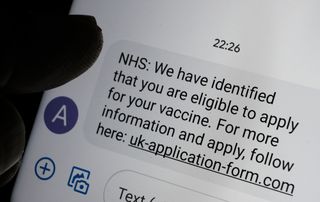COVID-related phishing fuels a 15-fold increase in NCSC takedowns
The NCSC recorded a significant jump in the number of attacks using NHS branding to lure victims

The UK's National Cyber Security Centre (NCSC) has revealed it thwarted more online scams during the pandemic than it had done in the previous three years combined.
COVID and NHS-themed cyber crime fueled the increase, with security experts recording a 15-fold rise in the removal of online campaigns in 2020 compared to 2019.
The findings were included in the NCSC's annual Active Cyber Defence (ACD) report, which was released ahead of the organisation's CYBERUK event this week.
It reported a significant jump in the number of phishing attacks using NHS branding to trick victims, while the COVID vaccine rollout was used as a lure in email and text messages to gain people's personal information for fraud. Some 43 fake COVID apps were also taken down by the security organisation.
The ACD programme also includes a 'Suspicious Email Reporting' service which the NCSC said had been "hugely successful" since its launch in April 2020. The service received nearly four million reports of malicious emails from members of the public in its first year.
The organisation also worked with a number of allies to call out hostile state activity, which includes help exposing Russian-state sponsored attacks on COVID vaccine facilities.
"The ACD programme is truly a collaborative effort, and it's thanks to our joint efforts with partners both at home and internationally that we've been able to significantly ramp up our efforts to protect the UK," said Dr Ian Levy, the NCSC's technical director.
Get the ITPro. daily newsletter
Receive our latest news, industry updates, featured resources and more. Sign up today to receive our FREE report on AI cyber crime & security - newly updated for 2024.
"This has never been more important than in the last year, where it was vital for us to do everything we could to protect our most critical services and the wider public during the pandemic."
In a separate report, Kaspersky has also warned that vaccine-related scams have continued to increase in 2021.
The cyber security company said its experts discovered various types of phishing pages distributed all over the world. As well as spam letters, recipients are being invited to get a vaccine, to take part in a survey, or are offered products to diagnose and treat the virus. Again, these are NHS-branded phishing attempts that aim to steal victims' personal information to be used for fraud.
Bobby Hellard is ITPro's Reviews Editor and has worked on CloudPro and ChannelPro since 2018. In his time at ITPro, Bobby has covered stories for all the major technology companies, such as Apple, Microsoft, Amazon and Facebook, and regularly attends industry-leading events such as AWS Re:Invent and Google Cloud Next.
Bobby mainly covers hardware reviews, but you will also recognize him as the face of many of our video reviews of laptops and smartphones.






